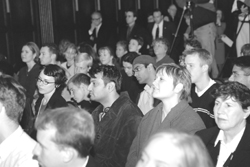The University Record, November 22, 1999 By Britt Halvorson

“This is truly a dream that I couldn’t conceivably have thought of, but these dreams do materialize,” said President Gerald R. Ford last Thursday.
He described the naming of the School of Public Policy in his honor as a culmination of his ties to the U-M. The renaming was unanimously approved by the Regents at their meeting in the Kuenzel Room of the Michigan Union, and will be effective next fall.
Ford, who apologized for leaving his recently acquired hearing aids at home, described his time as a U-M student in history and political science and spoke on subjects ranging from the school’s naming to admissions policies and Title IX. His comments followed those of President Lee C. Bollinger, School of Public Policy Dean Rebecca Blank and the members of the Board of Regents.
“It’s very overwhelming to sit here and think back to September 1931,” Ford said, commenting that while he was a student at the University women were not allowed in the front doors of the Michigan Union and the cost of tuition was $100 for two semesters.

Responding to questions from faculty, administrators, students and reporters, Ford discussed the University’s admissions policies, contemporary political issues, athletics and advice for public policy students.
Ford commented that he was in Congress when the basic legislation relating to affirmative action was proposed. Since that time, he has followed affirmative action cases, in California most recently, and also learned of the admissions lawsuits involving the U-M. At Bollinger’s request, Ford examined the University’s admissions policies.
“I was tremendously impressed with the process,” he said, “where they had seven or eight different criteria by which a student is graded as to his or her admissibility.” While noting he has always been opposed to categorical, numerical quotas, Ford said he found the University’s admissions policies to be logical and fair, which provided the impetus for his August New York Times op/ed piece defending affirmative action.
“I hope the courts will take a very objective look at the Michigan process because I think it’s fair and I hope they will agree,” Ford said.
When asked about important contemporary issues for public policy students, Ford commented, “In the area of domestic policy, there’s no question there has to be some serious study given to updating our Social Security legislation, our Medicare/Medicaid legislation.” Ford also listed campaign financing and international military policy as topics of concern to him. “We have to discuss where we draw the line between military action that we should take involving our own national security and military action we should take around the world on the pure basis of humanitarianism.” Military spending in the Persian Gulf would justify extended study at the school, Ford remarked.
Ford, who went from the Regents’ meeting to deliver a pep talk to the football team, also discussed athletics, both during his time as a student athlete when the “ball was round” and in his role in signing Title IX into law. Although several prominent people warned him not to force the implementation of women’s sports, Ford signed the bill. “I’m delighted to see the various female competitive sports getting more and more recognition,” he said.
When asked about the good and bad aspects of a public service career, Ford told the public policy students in the audience, “I happen to think that politics is a noble profession. I’m delighted that I’ve had the honor of serving for 28 active years in public office. I’m not going to mislead you. It’s very tough on your families. I was very lucky that my wife Betty was able to handle that situation. When you get into public life, private life does have a curtailment.”
Ford pledged his support to the School of Public Policy as it moves into a fund-raising campaign and works to strengthen its programs, noting that he would do whatever he could to make it one of the best schools on campus and on the national level. He said he hoped Blank would invite him back to Ann Arbor “once or twice” to challenge or be challenged by public policy students.
Ford stressed that his ties to the U-M are strong, citing its role in shaping his intellect, in encouraging his athletic inclinations and in preserving his presidential papers at the Ford Library. The naming of the School of Public Policy, Ford said, reaffirms his connection with the University.
“At no time in my lifetime would I have dreamed the name of Gerald R. Ford would be associated with a school of public policy at this great university.”

